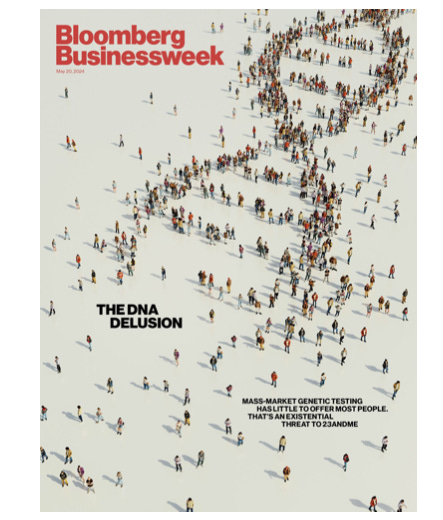Nutrition & Health News This Week
23andME is tanking; DC remains smitten with evidence-free "Food Is Medicine"; and Why industry may be right to fight "Ultra-processed" claims
23andME: the Disappointment of your DNA
The genome sequencing company, 23andME, held all the promise of the personalized medicine revolution when it shipped its first DNA test in 2007. By the time the company went public in 2021, it was valued at $3.5 billion. But 23andMe has never made a profit, according to an article published last week in Bloomberg Businessweek, and it’s now trading for well under a dollar a share, in imminent danger of being “delisted” from the stock market.
The problem is not in how 23andMe ran its company. Rather, the problem is that “[m]ass-market genetic testing has little to offer for most people,” says Businessweek. The article’s headline sums it up nicely: “The DNA Test Delusion.” And the rise-and-fall story that it tells speaks to all of personalized medicine and (so we think) personalized nutrition as well.
When the news broke in June 2000 that a rough draft of the human genome had been decoded, the accomplishment was hailed as one of the great breakthroughs in medicine. The promise was (and still is) that drugs, diet and lifestyle could be individualized, tailored to each person’s unique genetic code, maximizing the possibility of a long and healthy life.
Since then, researchers have learned an enormous amount about the genetic nature of diseases — particularly the 10,000 or so very rare disorders caused by single gene mutations that afflict perhaps 2% to 3% of the population — but the idea that we can improve our health in any meaningful way by decoding our DNA, let alone by paying $1000 to do so, has never panned out.
In retrospect, the problem is an obvious one. “Humankind’s leading killers,” as Businessweek describes them, are a cluster of chronic disorders that include obesity, diabetes, heart disease, stroke, cancer and dementia. There’s little reason to think these diseases can “be defeated by flipping the switch on a single gene. An unknown number of genes might play a role in the many bad things that can happen to your heart, and we understand very little about how those genes interact with one another.”
Keep reading with a 7-day free trial
Subscribe to Unsettled Science to keep reading this post and get 7 days of free access to the full post archives.





